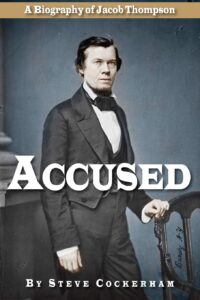April is the month when Robert E. Lee’s men stacked their arms at Appomattox, and when lilacs bloomed in the dooryards of Washington. It marks a time to recall a Mississippi politician whose career was a tangent to these events – a man who made his name in Oxford, before the Civil War – who was unable to prevent Confederate defeat and who did not (despite the charges brought against him) plot the assassination of Abraham Lincoln.

In “Accused,” Oxford author Steve Cockerham provides a thoughtful biography of Jacob Thompson. Where he can, Cockerham ties out his narrative to the records that Thompson left. Where the record goes dark, his conjectures are well-founded.
Jacob Thompson was born in North Carolina in 1810. Moving to North Mississippi in an era when planters still lived in log houses, he made his name as a lawyer and politician. He served in Congress and – unusually, given the demands of his career – found time to travel in Europe. (His teenage bride Kate Jones, reared in her father’s homestead on Woodson Ridge near Oxford, he escorted to Paris for a term at finishing school.) In 1848, Thompson gave the inaugural address when the University of Mississippi was opened, and he supported the new college by donating his books to its library. Rising ever higher in politics, he served as Secretary of the Interior under President James Buchanan.

The Civil War found Thompson on the side of the Confederacy. He saw fighting at Shiloh as an aide to General P.G.T. Beauregard. When the war moved across Mississippi, his own home was looted by Kansas cavalrymen, and himself was shot at as Union troops fought a skirmish on the approach to the Square (at the corner of what is now North Lamar and Jefferson Avenue). As Confederate forces retreated along the Mississippi Central rail line, he led a regiment in small battles outside Water Valley and Coffeeville.
“Like many officers in the Confederacy, Thompson had no military training,” Cockerham observes. “He simply showed up with his sharp mind and willing spirit and became an officer. . . . [This] amply illustrates the passion – some would say lack of reason – of southerners desperately determined to protect what they saw as their “way of life,” a phrase that remains part of the southern lexicon 150 years later.”
In 1864, Jefferson Davis sent Thompson to Canada on the most intriguing span of his career – as a Confederate spymaster. Initially, his mission was political: he hoped to aid Midwestern Democrats in their plan to withdraw Ohio, Indiana, and Illinois withdraw from the Union. However, as the fall election approached, Thompson increasingly fostered military plans. There were schemes to free Confederate prisoners-of-war, to destabilize Union currency by speculation in gold, to arm steamers on the Great Lakes. In October 1864, Confederate raiders crossed from Canada into Vermont, where they robbed three banks and shot up the town of St. Albans. After Sherman burned Atlanta, Confederate agents tried to set fire to New York City.
Whether Thompson approved this terrorism (beyond authorizing his men to burn the Brooklyn Navy Yard) remains an open question. One of his agents later wrote that Thompson was inclined to “trust too many men, doubt too little, and suspect less.” On the other hand, Cockerham acknowledges, it is also entirely likely that Thompson “took an Old Testament approach to the arson . . . a burning for a burning.”
At the end of the Civil War, when he and Kate made a hairs-breadth escape to London, Thompson was maligned by both sides. Union authorities charged him with a role in Abraham Lincoln’s assassination (a prosecution that collapsed when the chief witness turned out to be an impostor). Ex-Confederate rivals accused him of embezzling funds that Davis had entrusted to him.
Thompson battled these charges but was not haunted by them. A strength of this book is Cockerham’s ability to recognize certain strengths upon which Thompson could draw. He was a bookish man, but also a shrewd one – there are glimpses here not only of prudence, but of vision. If Thompson lived well in retirement, that was because he had transferred money to England before the war, after a financial panic in 1857. When he returned to public life, in the 1870s, it was in support of the University of the South.
A final, ironic recognition of Thompson’s acumen comes from the trustees of Sewanee. After his death in 1885, the trustees elected to accept $10,000 from Thompson’s estate. They made this choice because they doubted the alternative bequest he had offered them, “$100,000 in the Bell Telephone Company of Washington.” A man of his own day, Thomas could not preserve the antebellum past. That did not keep him from seeing into the future.
“Accused: A Biography of Jacob Thompson.” By Steve Cockerham. Triton / Nautilus Publishing. 268 pp. $19.95.
Allen Boyer, Book Editor for HottyToddy.com, is a native of Oxford. He is at work on a history of the law of treason.
